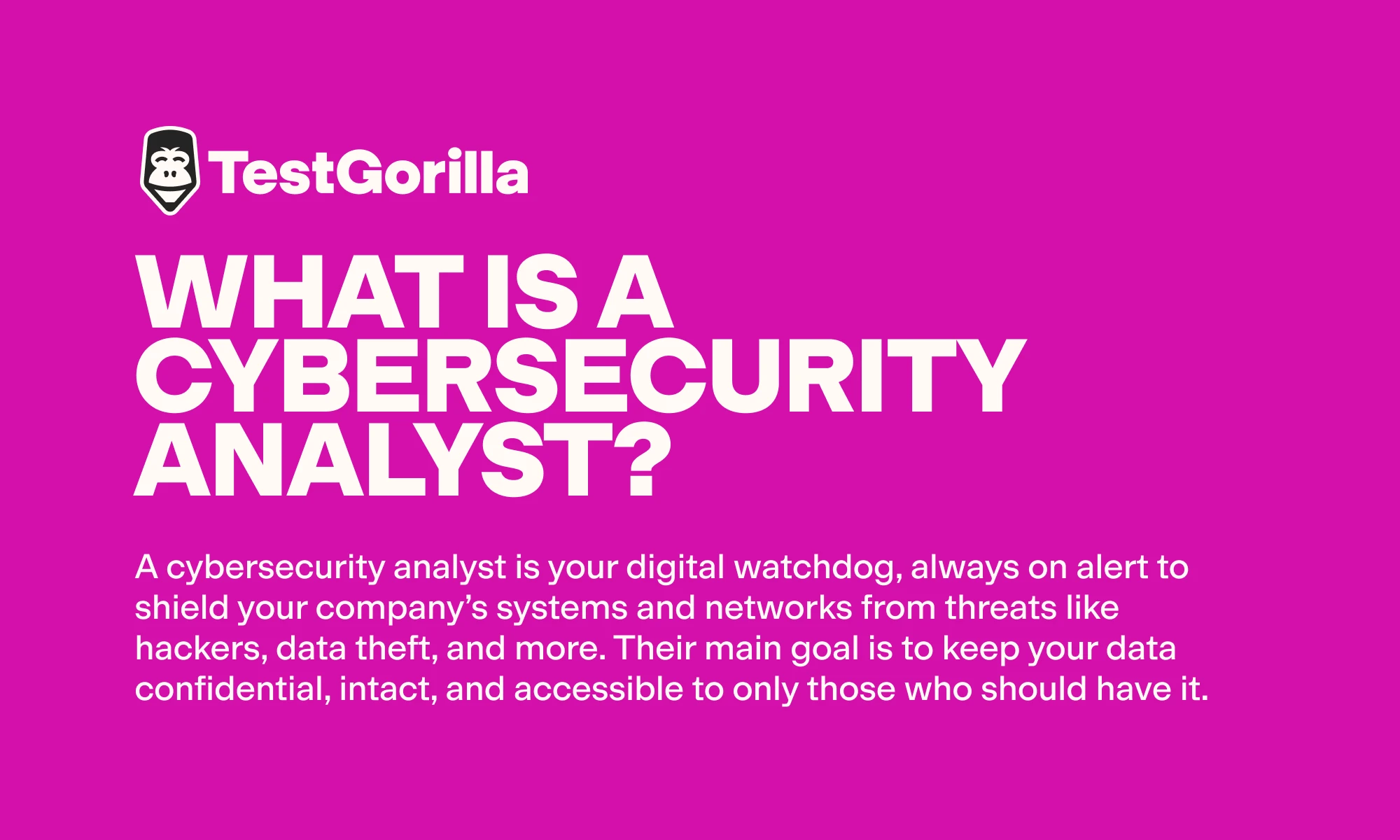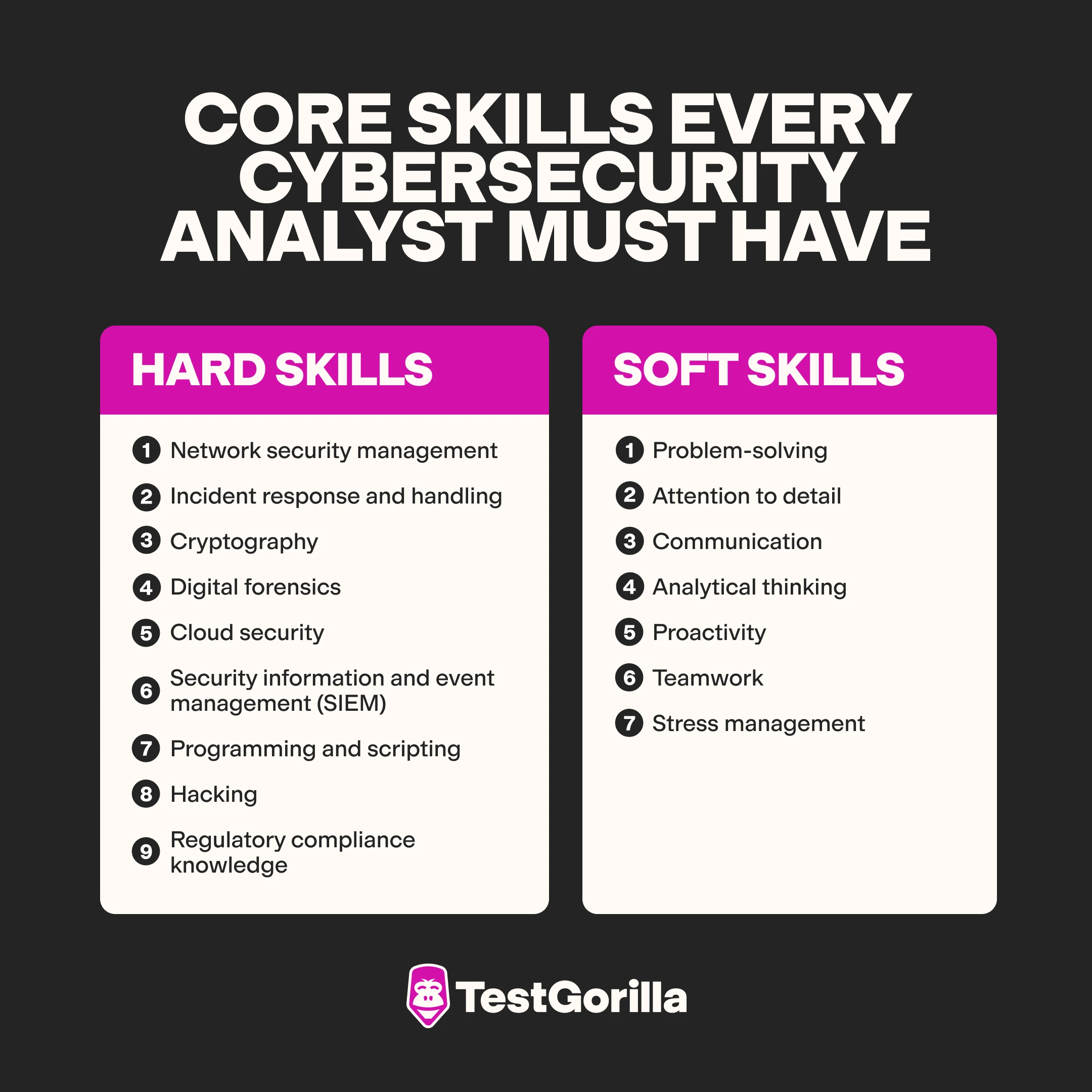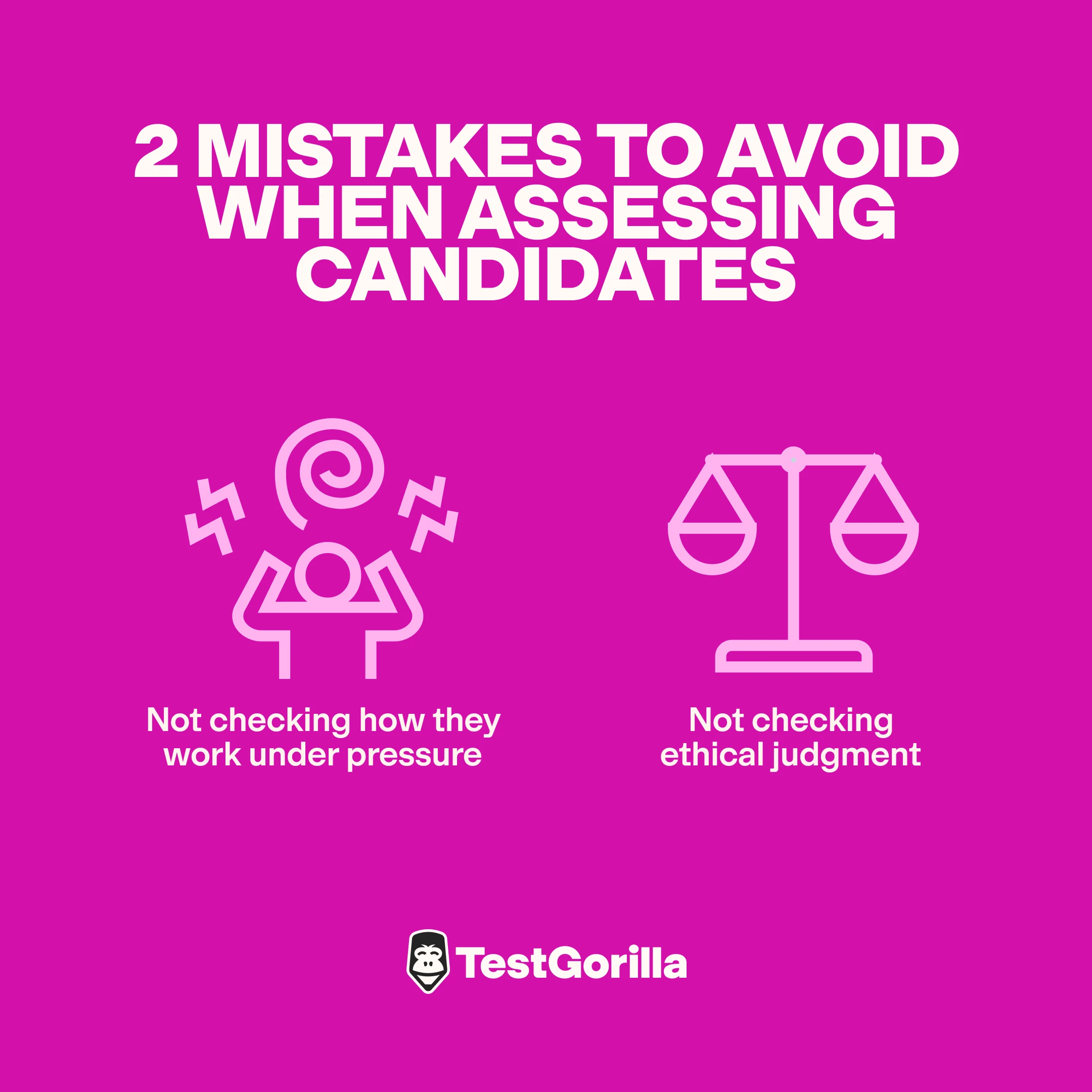Every day brings new cyber threats, each scarier than the last. These pose serious risks to businesses and their data. The safeguard? A sharp cybersecurity analyst. But picking the right analyst isn't always easy because they need a mix of skills to keep your systems safe.
If you're unsure about what this mix of skills looks like, you might hire an analyst who’s missing some essential skills. Then, your company might end up vulnerable to cyber-attacks, data leaks, and the costly messes they bring.
But there's no need to worry! Our guide is here to help by breaking down each skill your analyst needs. Plus, we dish the details on how to assess cybersecurity analyst candidates – so you can hire someone who truly defends your network. Keep reading to learn more!
What is a cybersecurity analyst?
A cybersecurity analyst is your digital watchdog, always on alert to shield your company’s systems and networks from threats like hackers, data theft, and more. Their main goal is to keep your data confidential, intact, and accessible to only those who should have it. This means making sure that unauthorized users – including those from inside and outside your company – don’t have access to your company data.
Cybersecurity analysts kick off their day by scanning your network for any suspicious activity, making sure your defenses are strong and up to date. This includes tweaking security measures such as firewalls and encryption. And if a security breach does happen? They’re right there, ready to respond and limit the damage.
They collaborate closely with IT staff to fix security weaknesses, update security protocols, and help everyone stay safe online. Occasionally, they take on the role of a hacker, testing your system to find vulnerabilities before real threats do.
On top of battling threats, they also make sure your company meets all the legal standards for keeping data safe.
Cybersecurity analysts are essential in just about any industry that relies on digital technology – from government to healthcare.
Core skills every cybersecurity analyst must have
Cybersecurity analysts must have the right mix of technical and interpersonal skills to keep an organization's digital spaces safe and sound. Here's a rundown of the essential hard and soft skills needed for anyone looking to thrive in this role.
Hard skills
These hard skills help your cybersecurity analyst secure and protect your digital data:
Network security management: Cybersecurity analysts should understand how your networks are structured and the best ways to shield them.
Incident response and handling: They must limit damage, retrieve data, and keep the business running smoothly when security breaches happen.
Cryptography: Keeping data safe, whether it's being sent around or stored, is a big deal. Analysts use encryption to lock down important info, keeping it away from prying eyes.
Digital forensics: Analysts must do detective work after a breach – digging into electronic data to figure out how the breach happened and what the attackers did.
Cloud security: They must manage who gets access to the cloud, make sure data is encrypted, and understand the cloud's security setup.
Security information and event management (SIEM): Being skilled with SIEM tools is all about staying alert. These tools help analysts watch for unusual activity in real time, making it easier to catch and respond to threats swiftly.
Programming and scripting: Knowing languages like Python, JavaScript, or PowerShell helps cybersecurity analysts build their own tools and automate tests to protect your network’s and quickly gather important security data.
Hacking: Cybersecurity analysts test your networks to find weak spots before someone else finds them.
Regulatory compliance knowledge: They need a good grasp of regulations – like GDPR or HIPAA – to make sure your company follows rules and meets legal requirements.
Soft skills
Your cybersecurity analyst should have the following soft skills:
Problem-solving for thinking on their feet, using creativity and logic to tackle tough security challenges
Attention to detail for checking data and logs and catching any unusual activity – no matter how small – that might be a security threat
Communication so they can translate tech-speak into plain English – and help the rest of the company understand risks and the needed security actions
Analytical thinking so they can look at complex data and spot patterns that could signal a cyber-attack
Proactivity for staying one step ahead of ever-growing cyber threats
Teamwork so they can work closely with IT teams to coordinate defenses, share updates on threats, and tackle incidents
Stress management so they can stay calm and focused, making quick, clear decisions even when the heat is on during a security breach
It’s essential to include the necessary skills in your job description when hiring a cybersecurity analyst. Learn how with our cybersecurity analyst job description template.
The best insights on HR and recruitment, delivered to your inbox.
Biweekly updates. No spam. Unsubscribe any time.
How to assess cybersecurity analyst candidates
Assessing cybersecurity analyst candidates involves looking deeply into their hard and soft skills. You want to make sure they’re the right person to protect your organization's digital assets effectively.
TestGorilla is a talent discovery platform that offers various tests that can help you identify candidates who have all the skills and other qualities necessary for your roles. Here’s how it works.
With our platform, you can create custom assessments by combining up to five tests. You can even include your own questions.
Doing this, you can make an assessment that’s perfect for probing the skills of your cybersecurity candidates. Here’s how you might approach this assessment.
Assess their hard skills first
To evaluate the hard skills of cybersecurity analyst candidates, you might use these tests:
Network Engineering test. This test looks at candidates’ knowledge of network infrastructures and security protocols – and sees how well they can troubleshoot common problems. It helps you check if they can manage and protect your organization's network effectively.
Cybersecurity Skills test. This test can clue you in to how well they might handle threats they experience on the job.
Cryptography test. This test checks whether they understand how to use cryptography to secure data transfers and storage.
Regulatory compliance tests. Tests like the HIPAA test and GDPR & Privacy test show you how much they know about data protection within their industries.
Penetration test. This test helps you find experts who can spot and report big security risks.
Coding and debugging tests for hacking. We also have tests that can help you figure out if candidates know how to understand and fix security flaws in software and systems – essential skills for ethical hacking. For example, check out our Python or JavaScript debugging tests.
Tool-specific tests: Depending on the tools your company uses for tasks like monitoring network traffic, managing large amounts of data, or operating cloud applications, our tool tests might be just what you need. For example, check out our tests on MongoDB and Heroku.
Afterwards, test their soft skills
To check out your candidates’ soft skills, you might use these tests:
Problem-Solving test. This one tests how well they can think critically and creatively to solve complex and unexpected problems.
Communication test. This test helps you see how clearly they can communicate. It can clue you in to how well they might be able to explain complex security issues to non-technical teammates.
Critical Thinking test. This one helps you understand how well they can reason – as they’ll need this skill when they’re putting together solid security plans.
Attention to Detail test. This one will show you how good they are at spotting inconsistencies in text. This can help you see how alert they are to unusual activity in the data and logs – no matter how small.
You can also use personality tests like the Big 5, the 16 Types, or the Enneagram tests. These can help you understand their work preferences, what motivates them, how they handle personal relationships, and more.
Then, use culture add assessments
Cybersecurity analysts work closely with different departments – like IT, legal, and human resources – to make sure strong security measures are in place. So, they need to be able to fit in with and get along with everyone in those departments.
But they shouldn’t just fit in – it’s great if they can also bring in new ideas and methods that improve your security practices. This is why our Culture Add test is a game-changer. The test helps you get a peek at your cybersecurity analyst candidates’ values and behaviors. This way, you can make sure you choose someone who will fit with your team and be a great addition to the company culture.
Finally, use interviews
If our tests don’t tell you everything you need to know about a candidate’s skills or other qualities, you can use the interview to learn what you need.
For instance, testing for proactivity is tough. But you can ask your candidates:
"Can you tell me about a time when you spotted a security threat before it was obvious to others? How did you catch it early, and what actions did you take to stop it from becoming a bigger problem?”
This question helps you understand how the candidate stays ahead of potential security issues, applies their foresight in real life, and leads their team to take early action.
Wondering how a candidate might perform in a tricky security situation? Ask them about their experience or give them a “what if?” scenario. This can give you a glimpse into how they might approach future security challenges.
Here’s an example:
"Can you walk me through a situation where you had to coordinate with other departments to respond to a cybersecurity incident? What role did you play, and what was the outcome?"
Want more questions to use? Read our guide on 111 cybersecurity interview questions.
2 mistakes to avoid when assessing candidates
Don’t make these mistakes – or you might hire the wrong cybersecurity analyst for your role.
1. Not checking how they work under pressure
Cybersecurity situations can get intense really fast, and how someone handles that pressure can make or break the response. If you don't check whether a candidate can stay cool and make smart choices when things heat up, you could end up with delays or mistakes when dealing with security issues.
For example, if they panic or can’t make decisions during a malware attack, they could allow the malware to spread and cause huge data loss and system downtime.
2. Not checking ethical judgment
It’s a big mistake to skip over checking a cybersecurity candidate's sense of right and wrong. These folks often handle sensitive info and face tough ethical choices. This is why they need to be trustworthy and stick to high moral standards – and not just know their tech stuff.
For example, imagine they discover a security weakness that could be exploited. The ethical choice involves reporting and fixing it – not using it to their advantage or ignoring it.
If you don’t make sure they have solid ethics, you might hire someone who's great with computers but not so great when it comes to making the right choices. This can lead to serious security problems and really hurt your company’s reputation.
FAQs
Here are some frequently asked questions about cybersecurity analysts.
What qualifications do you need to be a cyber security analyst?
Many companies hire cybersecurity analysts with degrees in cybersecurity or IT (or related fields) – or relevant certificates. However, some folks break into the field with bootcamps, certifications, and/or hands-on experience instead.
Can a cyber security analyst work from home?
Absolutely, many cybersecurity analysts do work from home. Their job mainly involves using computers to monitor systems and handle security breaches, so as long as they have a secure internet connection and the company is okay with it, they're good to go.
Find the best cybersecurity analyst for your team with TestGorilla
Finding the right cybersecurity analyst is key to protecting your company's digital setup. It's important that they know the necessary skills – from managing network security to ethical hacking – to keep your systems safe from growing cyber threats.
If you hire someone who lacks these key skills, your systems could be at risk of attacks and breaches. TestGorilla offers easy-to-use tools to check these skills thoroughly so you can pick the best person for your cybersecurity needs.
Want to improve how you hire? Check out the wide range of tests in our test library, book a demo, or sign up for a free account to get started now.
You've scrolled this far
Why not try TestGorilla for free, and see what happens when you put skills first.

















